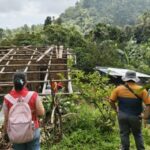CAMP ALEJO SANTOS, Bulacan – The chief of the Philippine National Police (PNP) highlighted faster and more accessible services through its 5-Minute Response Time (5-MRT) commitment, supported by the 911 hotline.
During his visit to the Bulacan Police Provincial Office (BPPO), Gen. Nicolas Torre III stated that every second of waiting feels like a lifetime to those in emergency situations.
“Many did not believe this could be done. Why five minutes? Because we believe that for a person who needs help and calls 911, every second of waiting is almost a lifetime—both figuratively and literally,” he said.
President Ferdinand R. Marcos Jr. praised the PNP’s rapid response capability, calling it a reflection of the government’s efforts in strengthening public safety.
The provincial government, led by Governor Daniel Fernando, donated 100 units of radio communication systems, a drone, 24 motorcycles, and a vehicle to the BPPO.
Fernando thanked the BPPO for keeping Bulacan safe, which led to the province’s recent recognition as the 3rd Safest Place in the Philippines according to the 2025 World Travel Index.
“The truth is, the skill and ability of our police force is commendable. In fact, through our unity and cooperation, the entire Bulacan was recognized as the third safest place in the Philippines. So thank you to our police,” Fernando said.
Bulacan Police Provincial Office
The **Bulacan Police Provincial Office (BPPO)** is the main headquarters of the Philippine National Police (PNP) in Bulacan Province, responsible for maintaining peace and order in the region. Established under the PNP’s organizational structure, it has played a key role in law enforcement, community safety, and anti-crime operations in Bulacan’s historically significant areas. Over the years, it has adapted to modern policing needs while upholding its mandate to serve and protect the province’s residents.
Philippine National Police
The **Philippine National Police (PNP)** is the national police force of the Philippines, established in 1991 under Republic Act 6975, replacing the former Philippine Constabulary and Integrated National Police. It operates under the Department of the Interior and Local Government (DILG) and is responsible for law enforcement, public safety, and crime prevention nationwide. The PNP traces its roots back to early Spanish colonial militias and has evolved through various reorganizations, reflecting the country’s changing political and social landscape.
Camp Alejo Santos
Camp Alejo Santos is a military camp located in Bulacan, Philippines, named after Brigadier General Alejo Santos, a World War II hero and former governor of the province. Established during the American colonial period, it served as a training site for Philippine military forces and played a role in local defense efforts. Today, it remains an active military facility under the Armed Forces of the Philippines.
911 hotline
The **911 hotline** is an emergency telephone service in the United States and Canada, established in 1968 to provide a quick and easy-to-remember number for police, fire, and medical emergencies. It was created after recommendations from government and public safety officials to streamline emergency response and has since become a critical lifeline, saving countless lives. The system has evolved with technology, now supporting text messages and enhanced location tracking to improve emergency assistance.
World Travel Index
The **World Travel Index** is not a specific cultural site or destination but rather a potential reference to rankings, guides, or databases that evaluate global travel destinations based on various criteria like tourism, infrastructure, or safety. If it refers to a publication or index (such as the *Travel and Tourism Development Index* by the World Economic Forum), it typically assesses countries’ travel and tourism competitiveness. For a precise summary, more context on the specific index or platform would be needed.
Would you like information on a particular travel ranking system or a famous cultural site instead?
Bulacan
Bulacan is a province in the Philippines known for its rich history and cultural heritage. It played a significant role in the country’s fight for independence, being a hotspot during the Philippine Revolution against Spanish rule and later a key location in the Philippine-American War. Today, it is celebrated for its historical landmarks, such as the Barasoain Church, and vibrant traditions, including its colorful festivals and craftsmanship in jewelry and embroidery.
Philippines
The Philippines is an archipelago in Southeast Asia with a rich cultural heritage shaped by indigenous traditions, Spanish colonization (1565–1898), and American influence (1898–1946). Known for its vibrant festivals, diverse languages, and historic sites like the Baroque churches of Manila and the ancient rice terraces of Banaue, it reflects a blend of Malay, Hispanic, and Asian influences. The country gained independence in 1946 and remains a unique cultural and historical crossroads in the Pacific.
5-Minute Response Time
“5-Minute Response Time” is not a recognized historical or cultural site, but rather a phrase often associated with emergency services, customer support, or military operations, emphasizing rapid reaction to calls or incidents. The concept highlights efficiency and preparedness, with origins tied to modern organizational standards in fields like healthcare, firefighting, or tech support. It reflects the prioritization of speed and reliability in critical situations, though it lacks a specific geographical or historical context.






